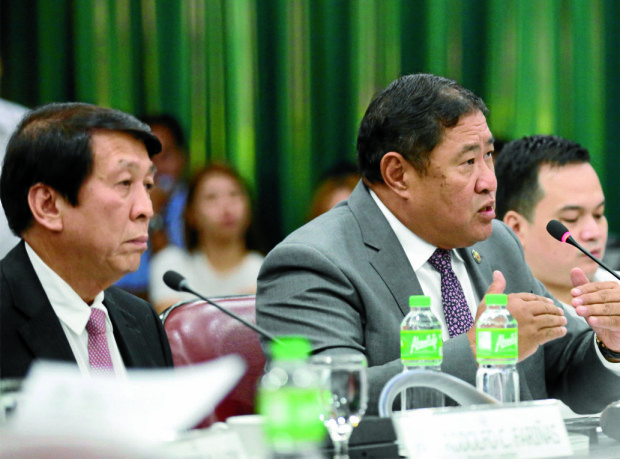
HOUSE HEARING Mindoro Oriental Rep. Reynaldo Umali (right), chair of the House justice committee, and House Majority Leader Rodolfo Fariñas ask for details of the allegations in the impeachment complaint filed against President Duterte by Rep. Gary Alejano. —JOAN BONDOC
The first impeachment complaint against President Duterte did not survive even for one day on the House of Representatives committee on justice, which called the accusations leveled by Magdalo Rep. Gary Alejano against Mr. Duterte “multiple hearsay.”
The committee declared the impeachment complaint sufficient in form but insufficient in substance. Forty-two congressmen stood to manifest their vote on the issue of substance.
Alejano accused the President of a litany of “high crimes,” including hiding wealth, ordering police to murder criminals and of making clear his intention not to protect Philippine maritime sovereignty.
“This is multiple, quadruple hearsay. And it is difficult to drag the whole House into things like this and you are expecting that we will issue the subpoena. Only the impeachment court could issue the subpoena if we [send] this to the Senate,” said Majority Leader Rodolfo Fariñas.
The complaint would have been subjected to a plenary vote had the committee found it sufficient in substance. A one-third vote of the 292-member House is needed to automatically send the complaint to the Senate for trial.
Following the dismissal of the impeachment complaint, presidential spokesperson Ernesto Abella said the allegations in the complaint were from “rehashed, trumped-up charges aimed at undermining the duly constituted government.”
Other modes
Sen. Antonio Trillanes IV is banking on “other modes” to go after the President.
The senator said the crimes against humanity case against Mr. Duterte filed in the International Criminal Court (ICC) in The Hague was one of those modes.
“They don’t have control over there and hopefully they’re more objective,” Trillanes said, referring to the ICC.
At the onset of the hearing, Fariñas wanted to have the complaint declared insufficient in form when he grilled Alejano on whether he had “personal knowledge” of the allegations he made in his impeachment complaint.
These included knowing the circumstances of the killings of more than 8,000 drug suspects in the Duterte administration’s war on illegal drugs; the more than 1,400 murders carried out by the so-called Davao Death Squad (DDS); the alleged P2.2 billion ill-gotten wealth of the President and his family; and the Chinese incursions into Philippine territory supposedly with Mr. Duterte’s consent.
Sufficient in form
The committee declared the complaint sufficient in form after holding an hourlong executive session, prompted by the motions of other committee leaders that the impeachment complaint be accepted as sufficient in form.
They cited the committee tradition of applying “liberality” in recognizing impeachment complaints, at least in form.
Mindoro Oriental Rep. Reynaldo Umali, chair of the justice committee, said Alejano’s original and supplemental impeachment complaints were deemed one because they were both transmitted to the committee on May 9.
At a press conference, Alejano slammed the committee’s swift killing of the impeachment complaint.
Probable cause
He said Fariñas, by insisting that his complaint was based on hearsay, effectively proceeded to the determination of probable cause instead of establishing first if the complaint was sufficient in form and substance.
Fariñas and Umali had a difficult time extracting a “yes” or “no” answer from Alejano, a battle-scarred Marine officer.
Alejano insisted that more than a yes or no, he should be allowed to explain his answers.
He said that while he did not have firsthand knowledge of the murders, he had witnesses he could present.
He obtained the official copies of Mr. Duterte’s speeches, as well as records of the Senate investigation of allegations that the President, when he was Davao City mayor, ordered the DDS to liquidate suspected criminals as alleged by confessed hit men Edgar Matobato and Arturo Lascañas.
Contents verified
“I affirm the contents of the verification that I have personal knowledge based on facts culled from authentic records,” Alejano said.
“I went through the records, the testimonies of the witnesses, I checked it and verified it and for the statements of the President I even went to the extent of getting official records from the PCOO (Presidential Communications Operations Office). And when I checked them, I believed in them … .” he said.
Alejano cited the impeachment against President Joseph Estrada, saying that none of the complainants and endorsers of the complaint had personal knowledge of the bribery charge but relied on the testimony of the main witness, Luis “Chavit” Singson.
Fariñas said Lascañas and Matobato should have been the complainants in the impeachment against Mr. Duterte.
The majority leader also assailed Alejano’s use of the confessed hit men’s affidavits, which were supported by the lawmaker’s ally Trillanes in the Senate investigation, saying that an affidavit is “hearsay” until it has been subjected to cross-examination.
Open source
Fariñas further criticized Alejano’s use of open source, such as news accounts of the alleged extrajudicial killings. He described Alejano’s complaint against Mr. Duterte as propaganda.
Albay Rep. Edcel Lagman of the independent minority bloc urged the committee to listen to Alejano’s recitation of facts to prove that his complaint was sufficient in substance.
“While it is true that an impeachment proceeding is a political exercise, it is not a partisan enterprise. A political process entails an exercise of values, advocacies and judiciousness. Partisanship is the direct opposite,” Lagman said.
But it was, ironically, Minority Leader Danilo Suarez who sounded the death knell for the impeachment complaint at the start of the proceedings by noting “we are impeaching a President with an 80.3-percent acceptance and popularity rating.”
“I have never seen a President, well he isn’t a year yet in office, who is not interested in enriching himself and that is one quality that we need: an honest President… At the end of the day, my honest opinion is, this impeachment will not fly,” Suarez said. —WITH REPORTS FROM CHRISTINE O. AVENDAÑO AND THE WIRES